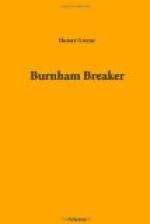“That’s jes’ like they did me,” said Ralph; “w’en I got sick up there at Scranton, they hadn’t no furder use for me, an’ they went away an’ lef’ me there alone.”
“That was a sad plight to be in. How did you meet that emergency?”
“I didn’t meet it at all. Bachelor Billy, he met it; he foun’ me, an’ cured me, an’ I live with him now, an’ work in the breaker.”
“Ah, indeed! at work. Laborarium est honorarium, as the Latin poet has it. How often have I wished that it were possible for me to earn my bread by the sweat of my brow; but, alas!—”
“Ain’t it?” interrupted Ralph.
“No, my dear boy, it isn’t. I have been afflicted, from my youth up, with a chronic disease which the best physicians of both continents have pronounced imminently dangerous to both life and happiness, if physical exercise be immoderately indulged in.”
“What is it?” asked Ralph, innocently.
“Indolentia, my dear boy, indolentia; a terrible affliction. But how about Grandpa Simon? Has he discovered your retreat?
“Has the bald, bad eagle of the
plain
Swooped down upon his prey again?”
“Well, not hardly that,” responded Ralph, “but he’s foun’ me.”
“Indeed! And what is his state of mind concerning you now?”
“He ain’t my grandfather,” said the boy, abruptly.
“Ain’t your grandfather! You startle me.”
“No, he ain’t no relation to me.”
“You take my breath away! Who are you, then?”
“I’m Ralph Burnham. I’m Robert Burnham’s son.”
Ralph had not meant to disclose so much, in this place, to this fellow, but the words came out before he thought. It did not matter much anyway,—every one would soon know it.
“Robert Burnham’s son? You don’t mean the rich coal proprietor who died at his mine in Scranton last spring?”
“Yes, he’s the one I mean. I’m his son.”
Rhyming Joe leaned across the table, lifted up the boy’s chin, and looked into his eyes. “My dear young friend,” he said, “I fear you have fallen into evil ways since you passed out of the range of my beneficent influence. But you should not try to impose so glittering a romance on the verdant credulity of an old acquaintance at the first meeting in many weary years.”
“To your faithful friend and true,
Tell the truth, whate’er you do.”
“Tis true!” asserted Ralph, stoutly. “Gran’pa Simon says so, an’ Lawyer Sharpman says so, an’ Mrs. Burnham, she—she—she almost believes it, too, I guess.”
The bar-tender approached again and asked what else they would have.
“A little something to wash the dinner down with, Bummerton,” said Joe, turning again quickly to Ralph.
“Then why don’t you live in the Burnham mansion?” he asked, “and leave rude toil for others?”
“’Cause my mother ain’t able to reco’nize me yet; she can’t do it till the suit’s ended. They’s other heirs, you know.”




